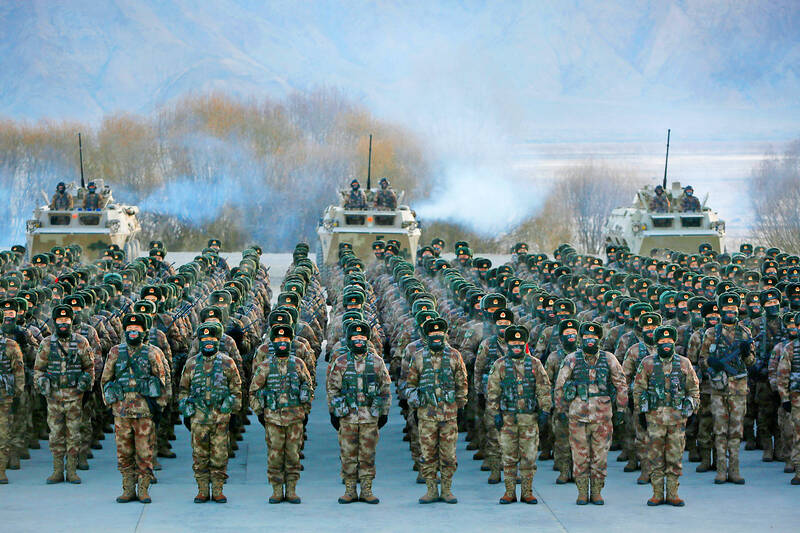Ukraine yesterday indicated it had changed its mind on a historic vote that saw the UN Human Rights Council refuse to debate alleged abuses in China’s Xinjiang region.
Western nations suffered a heavy defeat at the UN’s top rights body on Thursday when they failed to get enough votes to pass a first-ever attempted resolution targeting China.
The draft resolution, presented by the US and a number of other Western countries, merely asked the council to debate a UN report, citing possible crimes against humanity against Uighurs and other Muslim minorities in the China’s western Xinjiang region.

Photo: AFP
However, in a moment of knife-edge drama, countries on the 47-member council in Geneva, Switzerland, voted 19 to 17 against holding a debate on human rights in Xinjiang, with 11 nations abstaining.
Following an intense lobbying campaign by Beijing, many of the votes against and abstentions did not come as a huge surprise.
However, the decision by Ukraine, which relies heavily on Western backing as it battles Russia’s invasion, to abstain in the vote caught some off guard.
Ukraine itself appears to have had second thoughts.
In an unusual move, Ukrainian Permanent Representative to the UN Office and other International Organizations in Geneva Yevheniia Filipenko yesterday took the floor asking that the “record of the proceedings reflect our position in favor of the adoption of the mentioned decision.”
Council President Federico Villegas said the UN body would “take note of your statement,” but stressed that “in accordance with the rules and practices the result of the vote ... will remain as it was announced yesterday.”
Even if the result had shifted to reflect the changed vote, the resolution on China would still have failed, by one vote.
Among the council members backing China against the debate were Muslim-majority nations that have been benefactors of Beijing’s Belt and Road Initiative, including Pakistan, Kazakhstan, Indonesia, Qatar and the United Arab Emirates.
Beijing has dismissed allegations of rights abuses, including forced labor, as the “lie of the century,” and conducted tours for international diplomats that sought to emphasize the region’s political stability and economic transformation.
Additional reporting by Bloomberg

TRAGEDY STRIKES TAIPEI: The suspect died after falling off a building after he threw smoke grenades into Taipei Main Station and went on a killing spree in Zhongshan A 27-year-old suspect allegedly threw smoke grenades in Taipei Main Station and then proceeded to Zhongshan MRT Station in a random killing spree that resulted in the death of the suspect and two other civilians, and seven injured, including one in critical condition, as of press time last night. The suspect, identified as a man surnamed Chang Wen (張文), allegedly began the attack at Taipei Main Station, the Taipei Fire Department said, adding that it received a report at 5:24pm that smoke grenades had been thrown in the station. One man in his 50s was rushed to hospital after a cardiac arrest

A car bomb killed a senior Russian general in southern Moscow yesterday morning, the latest high-profile army figure to be blown up in a blast that came just hours after Russian and Ukrainian delegates held separate talks in Miami on a plan to end the war. Kyiv has not commented on the incident, but Russian investigators said they were probing whether the blast was “linked” to “Ukrainian special forces.” The attack was similar to other assassinations of generals and pro-war figures that have either been claimed, or are widely believed to have been orchestrated, by Ukraine. Russian Lieutenant General Fanil Sarvarov, 56, head

SAFETY FIRST: Double the number of police were deployed at the Taipei Marathon, while other cities released plans to bolster public event safety Authorities across Taiwan have stepped up security measures ahead of Christmas and New Year events, following a knife and smoke bomb attack in Taipei on Friday that left four people dead and 11 injured. In a bid to prevent potential copycat incidents, police deployments have been expanded for large gatherings, transport hubs, and other crowded public spaces, according to official statements from police and city authorities. Taipei Mayor Chiang Wan-an (蔣萬安) said the city has “comprehensively raised security readiness” in crowded areas, increased police deployments with armed officers, and intensified patrols during weekends and nighttime hours. For large-scale events, security checkpoints and explosives

PUBLIC SAFETY: The premier said that security would be tightened in transport hubs, while President Lai commended the public for their bravery The government is to deploy more police, including rapid response units, in crowded public areas to ensure a swift response to any threats, President William Lai (賴清德) said yesterday after a knife attack killed three people and injured 11 in Taipei the previous day. Lai made the remarks following a briefing by the National Police Agency on the progress of the investigation, saying that the attack underscored the importance of cooperation in public security between the central and local governments. The attack unfolded in the early evening on Friday around Taipei Main Station’s M7 exit and later near the Taipei MRT’s Zhongshan